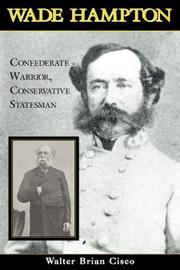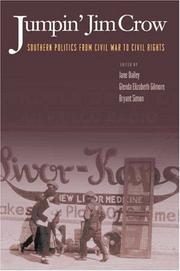| Listing 1 - 4 of 4 |
Sort by
|

ISBN: 1597974668 9781597974660 1574886266 9781574886269 1574886274 9781574886276 Year: 2004 Publisher: Washington, D.C. Brassey's
Abstract | Keywords | Export | Availability | Bookmark
 Loading...
Loading...Choose an application
- Reference Manager
- EndNote
- RefWorks (Direct export to RefWorks)
Winner of the 2006 Douglas Southall Freeman History Award
Legislators --- Governors --- Generals --- Hampton, Wade, --- United States. --- Confederate States of America. --- South Carolina --- Politics and government
Book
ISBN: 080327453X 9780803274532 9780803213548 0803213549 Year: 2009 Publisher: Lincoln
Abstract | Keywords | Export | Availability | Bookmark
 Loading...
Loading...Choose an application
- Reference Manager
- EndNote
- RefWorks (Direct export to RefWorks)
Generals --- Hampton, Wade, --- Confederate States of America. --- United States --- South Carolina --- History --- Cavalry operations. --- Hampton, --- Hampton Legion (South Carolina Volunteers) --- P.A.C.S. --- PACS
Book
ISBN: 1469604744 0807889008 9798893131536 Year: 2008 Publisher: Chapel Hill : University of North Carolina Press,
Abstract | Keywords | Export | Availability | Bookmark
 Loading...
Loading...Choose an application
- Reference Manager
- EndNote
- RefWorks (Direct export to RefWorks)
Few Southern elites gave more to the Confederate cause or suffered more in its defeat than General Wade Hampton III of South Carolina. One of the South's most illustrious military leaders, Hampton was for a time the commander of all Lee's cavalry and at the end of the war was the highest-ranking Confederate cavalry officer. Yet for all Hampton's military victories, he also suffered devastating losses. He lost a beloved son and a brother, his own home as well as his grandfather's ancestral mansion, and his vast personal fortune. He failed to deter Sherman's legions from capturing his hometown o
Generals --- Governors --- Legislators --- Reconstruction (U.S. history, 1865-1877) --- Hampton, Wade, --- Confederate States of America. --- United States. --- United States --- South Carolina --- History --- Cavalry operations. --- Politics and government

ISBN: 0691001936 0691001928 069121624X Year: 2000 Publisher: Princeton : Princeton University Press,
Abstract | Keywords | Export | Availability | Bookmark
 Loading...
Loading...Choose an application
- Reference Manager
- EndNote
- RefWorks (Direct export to RefWorks)
White supremacy shaped all aspects of post-Civil War southern life, yet its power was never complete or total. The form of segregation and subjection nicknamed Jim Crow constantly had to remake itself over time even as white southern politicians struggled to extend its grip. Here, some of the most innovative scholars of southern history question Jim Crow's sway, evolution, and methods over the course of a century. These essays bring to life the southern men and women--some heroic and decent, others mean and sinister, most a mixture of both--who supported and challenged Jim Crow, showing that white supremacy always had to prove its power. Jim Crow was always in motion, always adjusting to meet resistance and defiance by both African Americans and whites. Sometimes white supremacists responded with increased ferocity, sometimes with more subtle political and legal ploys. Jumpin' Jim Crow presents a clear picture of this complex negotiation. For example, even as some black and white women launched the strongest attacks on the system, other white women nurtured myths glorifying white supremacy. Even as elite whites blamed racial violence on poor whites, they used Jim Crow to dominate poor whites as well as blacks. Most important, the book portrays change over time, suggesting that Strom Thurmond is not a simple reincarnation of Ben Tillman and that Rosa Parks was not the first black woman to say no to Jim Crow. From a study of the segregation of household consumption to a fresh look at critical elections, from an examination of an unlikely antilynching campaign to an analysis of how miscegenation laws tried to sexualize black political power, these essays about specific southern times and places exemplify the latest trends in historical research. Its rich, accessible content makes Jumpin' Jim Crow an ideal undergraduate reader on American history, while its methodological innovations will be emulated by scholars of political history generally. In addition to the editors, the contributors are Edward L. Ayers, Elsa Barkley Brown, W. Fitzhugh Brundage, Laura F. Edwards, Kari Frederickson, David F. Godshalk, Grace Elizabeth Hale, Jacquelyn Dowd Hall, Stephen Kantrowitz, Nancy MacLean, Nell Irwin Painter, and Timothy B. Tyson.
African Americans --- Civil rights --- Southern States --- History --- Politics and government --- 1865 --- -Southern States --- Race relations --- Social conditions --- Sex role --- HISTORY / United States / General. --- History. --- Abernathy, Mary. --- Arkansas. --- Barnes, Mary. --- Butler, Matthew. --- Chamberlain, Daniel. --- Dare, Virginia. --- Douglass, Frederick. --- Edmonds, Richard. --- Edwards, Griffin. --- Forrester, Richard. --- Georgia. --- Hampton, Wade. --- Hinton, Mary Hilliard. --- Jews. --- Johnson, Andrew. --- Lebsock, Suzanne. --- Little Rock, Ark. --- Mahone, William. --- McFadden, Ida Caldwell. --- New Deal. --- North Carolina. --- Parker, John. --- Progressivism. --- South Carolina. --- anti-Semitism. --- black codes. --- child labor. --- consumption. --- federal intervention. --- general stores. --- ministers. --- patronage. --- racial terrorism. --- Gender role --- Sex (Psychology) --- Sex differences (Psychology) --- Social role --- Gender expression --- Sexism --- Afro-Americans --- Black Americans --- Colored people (United States) --- Negroes --- Africans --- Ethnology --- Blacks --- Black people --- Race relations. --- Social conditions. --- Gender roles --- Gendered role --- Gendered roles --- Role, Gender --- Role, Gendered --- Role, Sex --- Roles, Gender --- Roles, Gendered --- Roles, Sex --- Sex roles --- U.S. --- RACE RELATIONS --- POLITICS AND GOVERNMENT
| Listing 1 - 4 of 4 |
Sort by
|

 Search
Search Feedback
Feedback About UniCat
About UniCat  Help
Help News
News